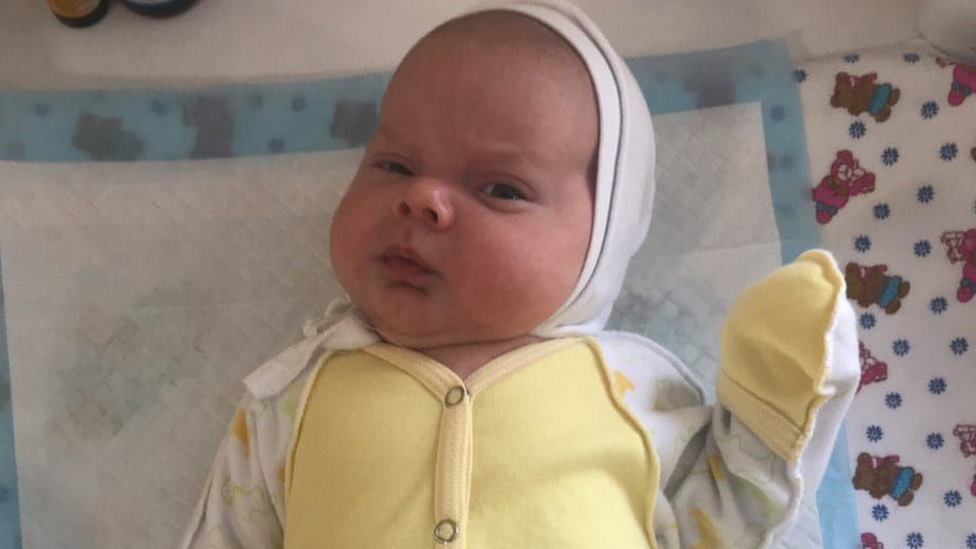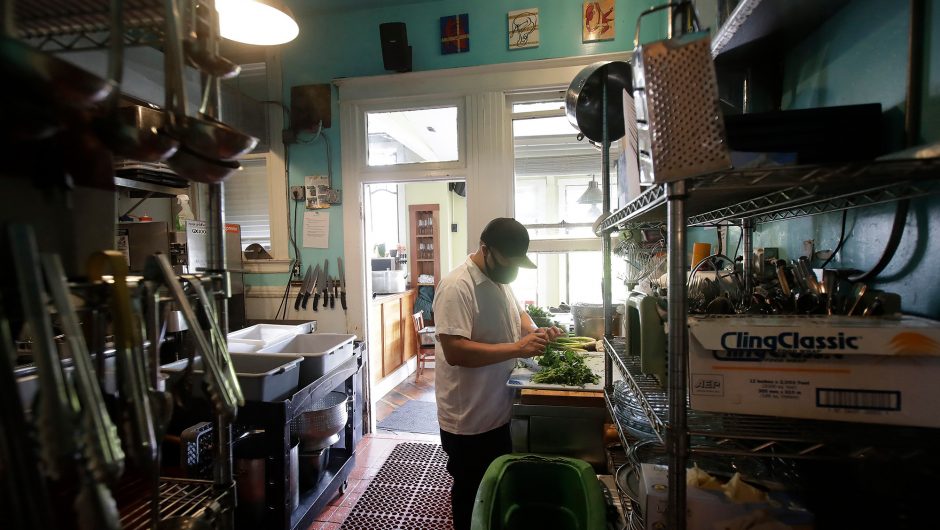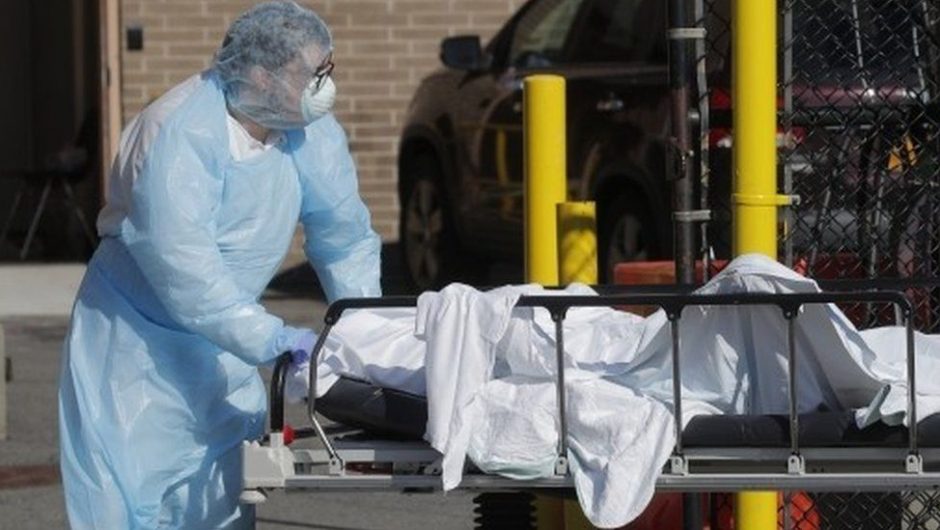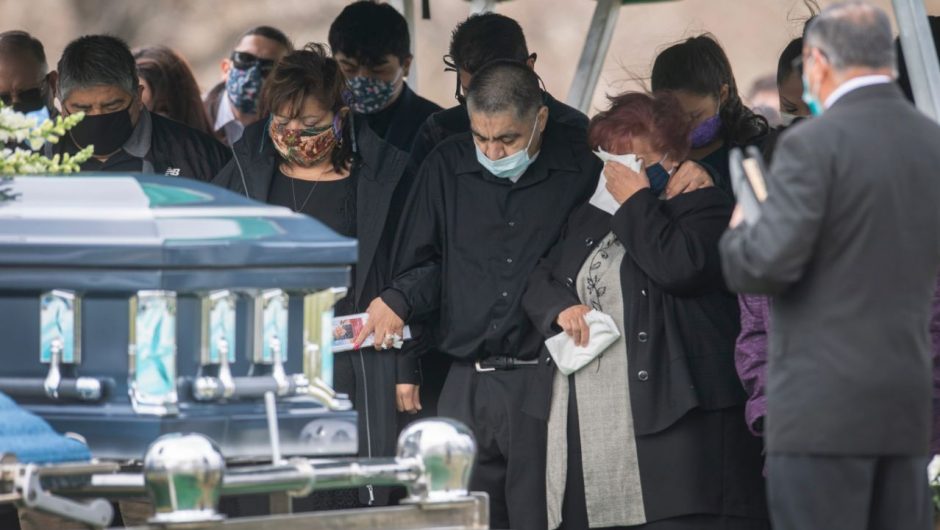Babies born to Ukrainian surrogates are being cared for in a hotel
When Flavia Lavorino decided to have a baby through surrogacy, she looked Ukraine up on a map and calculated the distance.
Some 12,800km (8,000 miles) separate Buenos Aires, in Argentina, from the Ukrainian capital, Kyiv.
“This was our last resort. We had stopped trying when we heard from a co-worker about trying for a baby through a gestational carrier in Ukraine, and we jumped at it,” says Flavia.
With José Pérez, her partner of 15 years, she had tried every possible fertility treatment. Flavia managed to get pregnant through a complex and painful procedure just once, but had a miscarriage.
“So, when we got confirmation that our surrogate in Ukraine was doing well and the pregnancy was going forward, we were over the moon,” says José.
Little could they predict that by the time the baby was born they would be stranded on the other side of the Atlantic due to the coronavirus pandemic.
Their son Manuel is now seven weeks old, but they have yet to meet him.
José and Flavia travelled to Ukraine in July 2019, but in March 2020 they were unable to travel there
“This is the worst nightmare. Imagine waiting for so long and then having to wait even longer, with no clear idea of when we could be allowed to travel,” says José.
Ukraine, like many other countries, has closed its borders to international visitors in an effort to limit the spread of Covid-19, which has killed more 300,000 people worldwide. That has left dozens of babies born to Ukranian surrogates – and due to be collected by their intended parents from overseas – in limbo.
Argentina has also imposed a travel ban on all commercial flights until September as part of a strict coronavirus lockdown, making it impossible for the couple to plan a trip for the foreseeable future.
‘We need to be with him’
“The physical contact at this point is key, he needs to be with us and we need to be with him,” says the new father.
Flavia and José started their surrogacy journey in December 2018 and travelled to Kyiv four months later to create their embryos out of his sperm and her eggs.
Demand for gestational carriers in Ukraine has soared in recent years
An embryo was then transferred into the womb of a gestational carrier, or “surrogate mother”, that they had contacted through a local clinic.
Story continues
“We never met our surrogate, the clinic managed the relationship and we don’t really know much about the specifics. We do know that her fees were paid, of course,” says José.
Commercial surrogacy is legal in Ukraine, and a big business too – though there have been concerns about the level of oversight of the industry, which has expanded significantly in recent years.
The cost of an average assisted reproduction package ranges from $30,000 to $50,000 (£25,000 to £41,000), a fraction of what it costs in the US and other countries where commercial surrogacy is permitted.
For the Argentine couple, it meant asking for a loan as well as borrowing money from family. They won’t say how much they have spent but that “probably half of it went to the surrogate”.
“When we got confirmation that the transfer had been successful in late July, we started planning every single detail. We wanted to travel days before the due date, which was 10 April,” says Flavia. “In the meantime, we lived this pregnancy through the monthly scans the clinic was sending us,” adds José.
From optimism to despair
The couple had booked transatlantic flights for 2 April, with a stopover in Madrid.
Flavia and José live 12,800km away from the Ukranian capital
As the coronavirus outbreak started spreading and hit Spain badly, they realised their trip might not happened as planned.
“But at first we didn’t think we wouldn’t be able to travel at all. I think we had this false optimism, it was more like, ‘uh, it may take us longer to get to Ukraine’. We kept on planning even as we watched airports starting to shut down everywhere,” says Flavia.
As European countries closed their borders and Argentina went into lockdown in mid-March, the couple began to despair. “I was terrified. We knew circumstances were exceptional, but we underestimated the implications,” says Flavia.
The picture got complicated further by the fact that both work in healthcare. Flavia is a social worker and José is a medical doctor in an intensive care unit at a hospital just outside Buenos Aires who has been treating Covid-19 patients.
As key workers, they were not allowed to take time off at first.
“We started communicating regularly with the Ukrainian clinic’s Spanish-speaking coordinators via WhatsApp to come up with a plan,” says José.
Stay put, was the message. The fertility centre had set up a place for Manuel to stay while he waited for his biological parents.
“They told us the newborn babies would be safe, taken care of, well fed… They calmed us down, at least as much as it was humanly possible,” says José.
‘Our baby was born 12,500km away’
The couple’s son was born early, on 30 March. The anxious parents were texted the news early in the morning as they were on their way to work.
“They told us we’d had a child, and we were 12,500km away… We had to stop the car, we almost had a crash,” remembers Flavia.
Later that day they got to see their healthy, 8lbs-baby boy for the first time – through a photograph.
Manuel – or Manu, as his parents call him – was born on 30 March
“Our surrogate asked the clinic if she could send us a WhatsApp message and she wrote to us to say she had a happy pregnancy, that she was proud to make our life-long dream come true,” says José. “We never got the chance to meet her but we told her she completed our family and forever transformed our lives,” adds Flavia.
Baby hotel
The Ukrainian clinic made arrangements for the stranded surrogate babies to stay at a small hotel the company owns on the outskirts of Kyiv.
And it is not just Manuel, some 50 newborns are being looked after in a large dormitory-style nursery.
“All they are doing is looking after the baby’s basic health and signs of a normal development,” says José. “But nobody will be able to give him the love of a parent during these crucial first weeks. That is heart-breaking.”
The clinic released images from the hotel to show the extent of the surrogacy crisis triggered by the pandemic
The number of babies being kept the hotel may keep growing if travel restrictions continue. New deliveries are scheduled over the coming weeks.
“We have Chinese babies, Italian babies, Spanish babies, British babies,” says Denis Herma, spokesman for BioTexCom Centre for Human Reproduction, the company behind the hotel.
The hotel is normally offered as accommodation for the biological parents coming to Ukraine to collect their child. Now it is run by a team of nurses working round the clock under strict quarantine rules, says the fertility company.
A video circulated by BioTexCom just days ago, and published by media around the world, shows the number of babies born to surrogates which have not been able to be picked up due to the lockdown.
The images have also reignited the debate about what critics say is a loosely-controlled “baby-making business” in this Eastern European country.
By Zhanna Bezpiatchuk – BBC News Ukraine, Kyiv
From 2015, as surrogacy hotspots in Asia began shutting down one-by-one amid reports of exploitation, Ukraine turned into a global hub for commercial surrogacy.
With relatively low prices compared to other countries, looser regulations and growing demand from overseas, Ukrainian reproductive clinics are booming.
Many Ukrainian women, mostly from small towns or rural areas, see this as a financial opportunity. The full package may cost around $50,000 and a surrogate may get less than half that – but this is still big money by Ukrainian standards.
Surrogate mothers have regular health check-ups provided by clinics and surrogacy agencies
A surrogate mother must have at least one child of her own in order to be eligible. She will have no genetic link and never takes care of the newborn. This is a strict rule designed to prevent any emotional attachment.
The quarantine has laid bare some hard truths that Ukrainian health care officials seem to have ignored. Nobody knows exactly how many babies are born here each year through surrogacy. Two months into lockdown, at least 100 babies are separated from their parents.
Cots at the hotel are arranged in rows, names are printed in bright colours on each baby’s sleepsuit. “We feel very sorry for them, we know no one can replace their parents,” nurse Olha Kuts tells the BBC.
José and Flavia get daily updates from the nurses on shift, some of whom speak Spanish. “When he turned one month we had a really long videocall, it was so lovely of them,” says Flavia. “It made all the difference to be able to talk to him and see him in real time.”
But more babies are coming in and “they cannot spend as much time as parents would like, it’s becoming more complicated”, says José.
Diplomatic negotiations
Ukraine’s borders have been closed since March but some families have managed to travel with special permits.
Boryspil International airport, Ukraine’s biggest, was closed on 16 March
There are also negotiations under way with the Ukrainian authorities, through the embassies and consulates of the parents’ countries of origin.
The parents of 15 babies have been allowed in so far, including a couple from Sweden that reached the Ukrainian capital on a private jet paid for by an anonymous donor.
In Argentina, there are 16 other families in the same position as Flavia and José. Three babies have been born already, and the rest are due between late May and September.
The parents have launched a joint petition asking both governments to listen to their plea.
“We waited for around 20 days because we understand these are very complicated times. Then we put in a legal request,” explains José.
Negotiations have moved forward and Ukraine has just agreed to let them enter the country. They are now asking the Argentine government to authorise a flight on humanitarian grounds.
They are hoping to get a resolution “before the end of the month”.
But the wait will not be over when they land on the other end. “We will need to self-isolate for 14 days before we can see Manu,” says Flavia.
“It makes sense as there are risks involved with flying across the world, and it is also wise in terms of the wellbeing of the baby.”
Kyiv has slowly started to ease restrictions. The Zhytniy market resumed operations in mid-May
Then they will need to process the baby’s documents before heading back to Argentina – if they are allowed back in before the borders officially re-open.
“We don’t care about that second leg of the trip at this point. We have a son that is seven weeks old and he is far away, we need to get there and then we’ll see,” Flavia says.
“It has been so hard to get to this point, for us to have a baby, so physically and emotionally draining. We need that wait to be over.
“We need to meet him. We’ll take care of everything else later.”








